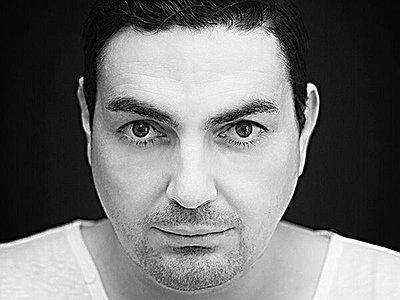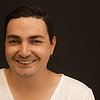Part 1
Name: Olivier Giacomotto
Nationality: French
Occupation: DJ, Producer, Composer, Remixer
Current Release: The Red Man Original Motion Picture Soundtrack available on beatport
Musical Recommendations: I would definitely recommend Kiko because I work a lot with him in the studio and on stage, and we just created our collab name called « COLD MILES ». Our first 'Cold Miles' EP will be out in September on Noir Music and I would also recommend Citizen Kain because we played back-to-back together and it was such a good gig. Kiko, Citizen Kain and myself are preparing something for the near future. I hope I’ll have the opportunity to tell you more about it before the end of the year.
Website/ Contact: If you enjoyed this interview with Olivier Giacomotto you can check him out on Soundcloud.
When did you start writing/producing music - and what or who were your early passions and influences?
I've always loved music. I started with piano when I was 8, then guitar when I was 14, then I bought my first synthesizer when I was 18. Then I started to produce electronic music with my first PC in 1999. Back in those days I simply wanted to record and sequence what I had in mind, which was a wide range of non-electronic and electronic music. My main influences at that time were bands from the 70’s, 80’s, and 90’s like Pink Floyd, Depeche Mode, Red Hot Chili Peppers, Steel Pulse, Funkadelic, Maceo Parker and Kesiah Jones, but also Portishead, Dead Can Dance, Freak Power, Tricky, Howie B and many more…
For most artists, originality is first preceded by a phase of learning and, often, emulating others. What was this like for you? How would you describe your own development as an artist and the transition towards your own voice?
There's always a phase where you try to find a way to make songs, to find your own sound, and even your own style. Mine was between 1999 - 2003, I spent 4 years in my apartment trying to find something that would be good enough to be signed by a decent label. So I went from hiphop, trip hop, drum&bass, breakbeat to electro, house, deep house, techno and finally made a demo that was good enough to be signed, it was in late 2003 when I signed my first record deal with a label called Lupp from Belgium and that record was charted by Carl Cox in April 2004 and that’s how my career started.
What were your main compositional- and production-challenges in the beginning and how have they changed over time?
As I said, the first goal is to get enough quality to be signed, technically and creatively. The challenge is the same over time, only the quality and creativity level change. Step by step I acquired more knowledge to be able to increase my skills and techniques, this way the ideas in my mind are translated with more accuracy on my hard drive.
Tell us about your studio, please. What were criteria when setting it up and how does this environment influence the creative process? How important, relatively speaking, are factors like mood, ergonomics, haptics and technology for you?
Ideas are more important than technology. I always wanted to keep my studio small enough to be moved everywhere in the world, on a train, on a plane, in a hotel, that’s why I only have a laptop with Logic and some very good plug-ins and soft synths; this way I can compose everywhere. In my house I only have a good pair of monitors (right now I have a pair of Event Opal), a good soundcard (RME Fireface 800) and a small room with good acoustic treatment.
What are currently some of the most important tools and instruments you're using?
Soft synth mainly, like Native Instruments Massive, Monark and Arturia's Moog and Arp2600 etc… as I said, ideas are more important than technology.
Many contemporary production tools already take over significant parts of what would formerly have constituted compositional work. In which way do certain production tools suggest certain approaches, in which way do they limit and/or expand your own creativity? Are there any promising solutions or set-ups capable of triggering new ideas inside of you as a composer?
Not really, I think I have a different approach to composition, because I use concepts and ideas and don’t need to focus on technology. Most of the time I already have in mind what I want in my tracks; the challenge is to be able to translate those ideas into sounds, or those concepts into reality. Tools remain tools, you still have 1 brain and 2 hands on those tools if you want to achieve something unique.
Could you describe your creative process on the basis of a piece or album that's particularly dear to you, please? Where do ideas come from, what do you start with and how do you go about shaping these ideas?
Ideas sometimes pop up in my mind as concepts, like signs with directions written on it. The start can be a sample, a vocal phrase, or 3 notes on a synth, then more ideas come around, taking into consideration the references and boundaries I set up and keep in mind. Those references are built with my influences and goals; as I said, it’s very conceptual.






